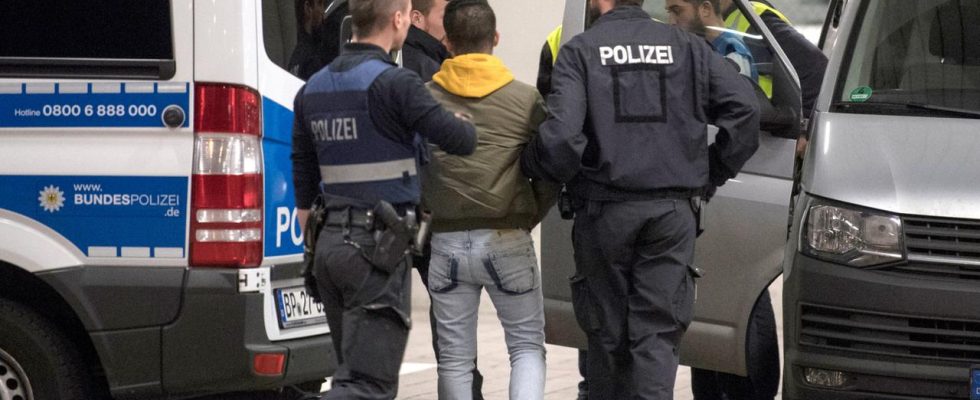faq
The Bundestag has passed the “Repatriation Improvement Act”, which is intended to simplify deportations. The federal government is reacting to the increased number of asylum seekers and demands from local authorities. What exactly does the law provide?
In view of overburdened municipalities, Chancellor Olaf Scholz called for rejected asylum seekers to be deported “on a large scale” in the fall. Interior Minister Nancy Faeser then presented a bill “to improve repatriation”. The Bundestag has now passed the law – with the votes of the traffic light coalition. The Union and AfD voted against the law because they did not go far enough. Some members of the Green Party, for whom the tightening goes too far, also voted no in the vote. An overview of the key points:
What additional powers should the police be given?
Search options for the police should be expanded. On the one hand, this applies to the search for documents and data on the identity of the person concerned, for example in order to determine their home country.
On the other hand, officials in shared accommodation should in future also be allowed to search rooms other than the deportee’s room. From now on, it should also be possible to pick up those affected at night, for example if a deportation flight organized by another country takes off early in the morning.
Deportations should also no longer have to be announced unless families with children under the age of twelve are affected. Objections and lawsuits against entry and residence bans should no longer have a suspensive effect.
What applies to the detention of Persons obliged to leave the country?
The maximum duration of immigration detention is to be extended from the current 10 to 28 days. This gives authorities more time to prepare for a deportation and is intended to prevent the person being deported from going into hiding.
In addition, an independent reason for detention is created for violations of entry and residence bans. This applies to foreigners who initially entered Germany legally and were later required to leave. In addition, the possibility of so-called cooperative detention will be extended to cases in which a foreigner fails to provide information to clarify his or her nationality.
How should the deportation of smugglers be accelerated?
The Residence Act is intended to create regulations that make it easier to expel smugglers. In the future, there will be a “particularly serious interest in deportation” if there has been a conviction for smuggling for at least one year. Penalties for smugglers should also be generally tightened.
Can clan members be deported?
The original draft law stipulated that a new expulsion offense should be created for foreign members of gangs or criminal clans – and that this should also apply “regardless of a criminal conviction”.
This is unlikely to happen now. An amendment proposed by the traffic light parties is primarily aimed at intensive offenders who have been convicted “multiple times” within a year.
How does it look? anti-Semitic crimes?
According to the traffic light’s change plans, it is expressly stated that an anti-Semitic motive for an act established in a judgment gives rise to a serious interest in deportation. This also applies to racist, xenophobic, gender-specific or sexual orientation motives.
How many people were there recently? obliged to leave the country?
According to the Federal Ministry of the Interior, 242,642 people were required to leave the country at the end of December. However, 193,972 of them had a toleration permit to remain in Germany. This means that deportation was temporarily suspended in four out of five cases.
Reasons for this can be the security situation in the country of origin, children with a residence permit, qualified vocational training that has begun, illness or the lack of passport and travel documents.
How many deportations were there in 2023?
According to the Interior Ministry, 16,430 people were deported last year. That was 27 percent more than in 2022. At that time there were 12,945 deportations – eight percent more than the year before.
Why do deportations fail?
Last year, 31,770 planned deportations failed. This means that two thirds of the planned returns were not successful. Reasons included canceled deportation flights, foreigners required to leave the country could not be found, the destination country refused to accept them or medical problems.
Will the package actually speed up deportations?
The Interior Ministry does not expect a massive increase in deportations. “It is assumed that the tightening of the obligation to leave the country will increase the number of deportations by around 600 (five percent),” says the draft law.
The federal government is also aware that stricter deportation laws are only one side of the coin. Because without accepting countries of origin, deportations are not possible.

